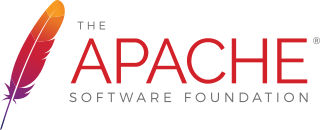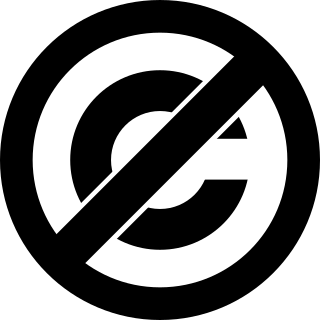
Free software, libre software, libreware sometimes known as freedom-respecting software is computer software distributed under terms that allow users to run the software for any purpose as well as to study, change, and distribute it and any adapted versions. Free software is a matter of liberty, not price; all users are legally free to do what they want with their copies of a free software regardless of how much is paid to obtain the program. Computer programs are deemed "free" if they give end-users ultimate control over the software and, subsequently, over their devices.
The MIT License is a permissive software license originating at the Massachusetts Institute of Technology (MIT) in the late 1980s. As a permissive license, it puts very few restrictions on reuse and therefore has high license compatibility.

Open-source licenses are software licenses that allow content to be used, modified, and shared. They facilitate free and open-source software (FOSS) development. Intellectual property (IP) laws restrict the modification and sharing of creative works. Free and open-source licenses use these existing legal structures for an inverse purpose. They grant the recipient the rights to use the software, examine the source code, modify it, and distribute the modifications. These criteria are outlined in the Open Source Definition.
The Open Source Definition (OSD) is a document published by the Open Source Initiative. Derived from Bruce Perens' Debian Free Software Guidelines, the definition is the most common standard for open-source software. The definition has ten criteria, such as requiring freely accessed source code and granting the open-source rights to everyone who receives a copy of the program. Covering both copyleft and permissive licenses, it is effectively identical to the definition of free software, but motivated by more pragmatic and business-friendly considerations. The Open Source Initiative's board votes on proposals of licenses to certify that they are compliant with the definition, and maintains a list of compliant licenses on its website. The definition has been adapted into the Open Knowledge Foundation's Open Definition for open knowledge and into open hardware definitions.

The Apache License is a permissive free software license written by the Apache Software Foundation (ASF). It allows users to use the software for any purpose, to distribute it, to modify it, and to distribute modified versions of the software under the terms of the license, without concern for royalties. The ASF and its projects release their software products under the Apache License. The license is also used by many non-ASF projects.
The FreeBSD Documentation License is the license that covers most of the documentation for the FreeBSD operating system.
The Academic Free License (AFL) is a permissive free software license written in 2002 by Lawrence E. Rosen, a former general counsel of the Open Source Initiative (OSI).
The Historical Permission Notice and Disclaimer (HPND) is an open source license, approved by the Open Source Initiative (OSI) and verified as GPL-compatible by the Free Software Foundation.
A permissive software license, sometimes also called BSD-like or BSD-style license, is a free-software license which instead of copyleft protections, carries only minimal restrictions on how the software can be used, modified, and redistributed, usually including a warranty disclaimer. Examples include the GNU All-permissive License, MIT License, BSD licenses, Apple Public Source License and Apache license. As of 2016, the most popular free-software license is the permissive MIT license.
This comparison only covers software licenses which have a linked Wikipedia article for details and which are approved by at least one of the following expert groups: the Free Software Foundation, the Open Source Initiative, the Debian Project and the Fedora Project. For a list of licenses not specifically intended for software, see List of free-content licences.
The ISC license is a permissive free software license published by the Internet Software Consortium, now called Internet Systems Consortium (ISC). It is functionally equivalent to the simplified BSD and MIT licenses, but without language deemed unnecessary following the Berne Convention.

The WTFPL is a permissive free software license. As a public domain like license, the WTFPL is essentially the same as dedication to the public domain. It allows redistribution and modification of the work under any terms. The name is an abbreviation of Do What The Fuck You Want To Public License.

Public-domain-equivalent license are licenses that grant public-domain-like rights and/or act as waivers. They are used to make copyrighted works usable by anyone without conditions, while avoiding the complexities of attribution or license compatibility that occur with other licenses.

A free-software license is a notice that grants the recipient of a piece of software extensive rights to modify and redistribute that software. These actions are usually prohibited by copyright law, but the rights-holder of a piece of software can remove these restrictions by accompanying the software with a software license which grants the recipient these rights. Software using such a license is free software as conferred by the copyright holder. Free-software licenses are applied to software in source code and also binary object-code form, as the copyright law recognizes both forms.
BSD licenses are a family of permissive free software licenses, imposing minimal restrictions on the use and distribution of covered software. This is in contrast to copyleft licenses, which have share-alike requirements. The original BSD license was used for its namesake, the Berkeley Software Distribution (BSD), a Unix-like operating system. The original version has since been revised, and its descendants are referred to as modified BSD licenses.

Copyleft is the legal technique of granting certain freedoms over copies of copyrighted works with the requirement that the same rights be preserved in derivative works. In this sense, freedoms refers to the use of the work for any purpose, and the ability to modify, copy, share, and redistribute the work, with or without a fee. Licenses which implement copyleft can be used to maintain copyright conditions for works ranging from computer software, to documents, art, and scientific discoveries, and similar approaches have even been applied to certain patents.
The MirOS Licence is a free content licence originated at The MirOS Project for their own publications because the ISC license used by OpenBSD was perceived as having problems with wording and too America centric. It has strong roots in the UCB BSD licence and the Historical Permission Notice and Disclaimer with a focus on modern, explicit, legible language and usability by European, specifically German, authors. It is a permissive ("BSD/MIT-style") licence.
The zlib license is a permissive software license which defines the terms under which the zlib software library can be distributed. It is also used by many other open-source packages. The libpng library uses a similar license, libpng license, sometimes referred interchangeably as zlib/libpng license.
The Fair License is a short, simple and permissive free software licence. Its text is composed of only one sentence and a disclaimer, thus being the shortest license ever approved by the Open Source Initiative. It is also possible to use the Fair License for images, books, music or more generally all kinds of media. The text of the license is as follows:
<Copyright Information> Usage of the works is permitted provided that this instrument is retained with the works, so that any entity that uses the works is notified of this instrument. DISCLAIMER: THE WORKS ARE WITHOUT WARRANTY.

The Unlicense is a public domain equivalent license for software which provides a public domain waiver with a fall-back public-domain-like license, similar to the CC Zero for cultural works. It includes language used in earlier software projects and has a focus on an anti-copyright message.





